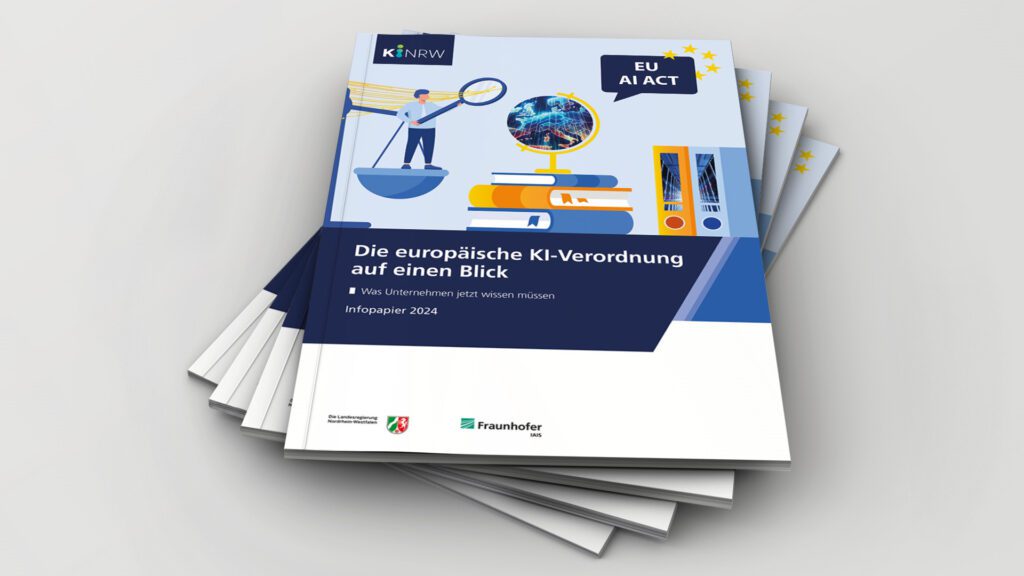AI Act: What companies need to know now
On May 21st, 2024, the European Union adopted the European AI regulation, the so-called AI Act (to the law text). KI.NRW helps companies to get an overview of how they can comply with the requirements of the AI Act and where they can get support with their questions. We have answered the most important FAQs below:

What does the AI Act regulate and for what purpose?
The AI Act is the first transnational law to regulate artificial intelligence. One of the European Union’s aims is to protect EU citizens from the potential negative effects of AI applications and at the same time to promote innovation in the field of trustworthy artificial intelligence. A uniform EU-wide legal framework is intended to ensure the free movement of AI-based goods and services across borders while guaranteeing a high level of protection for health, safety and fundamental rights.
What does artificial intelligence mean in terms of the AI Act?
The AI Regulation is based on two main definitions of AI:
- It is designed for varying degrees of autonomous operation,
- can be adaptable once it is operational and
- derives from the inputs received for explicit or implicit objectives how outputs, e.g. predictions, content, recommendations or decisions, are produced. -> Art. 3 AI Act
- This has considerable general applicability,
- is capable of competently fulfilling a wide range of different tasks and
- can be integrated into a large number of downstream systems or applications. -> Art. 3 AI Act
Is the AI Act already fully applicable?
The AI Act came into force on August 1st, 2024. Prohibitions and obligations are now gradually coming into force:
- After six months (February 2nd, 2025), AI systems with unacceptable risk are prohibited.
- After twelve months (August 2nd, 2025), governance rules and the obligations for general-purpose AI models will take effect.
- After 24 months (August 2nd, 2026), the majority of the regulations will take effect, for example for high-risk AI systems in accordance with Annex III.
- After 36 months (August 2nd, 2027), provisions for high-risk AI systems that are affected by the regulation via sectoral harmonization provisions will take effect.
How do you get an overview as a company and how do you meet your requirements under the AI Act?
We recommend that companies in particular gain a solid overview of the use of AI and check whether the legislator imposes any obligations on you. You can read in detail about the individual steps required for this, starting with an inventory of the AI applications used through to checking the risk category, in the AI Act info paper from KI.NRW. There you can also find out what needs to be done for AI applications with no to a manageable risk, as well as for those that fall into the high-risk category.
Where do you get official support?
The EU Commission has already appointed a central supervisory authority for artificial intelligence, the European AI Office. Its work will focus on general purpose AI (GPAI) models: it will carry out assessments, demand information and measures from providers and impose sanctions. In addition, it will support the governing bodies in the member states in their tasks, promote international cooperation in the context of trustworthy AI and support the enforcement of the AI Act. The office is currently being set up, but is already organizing information events and providing information about the AI Act. Contact for general inquiries: CNECT-AIOFFICE@ec.europa.eu.
Only part of market surveillance (in particular the monitoring of GPAI) is implemented centrally by the EU Commission’s AI Office. The majority of supervision is the responsibility of the member states. As of November 1st, 2024, it is still unclear which authority in Germany will be tasked with enforcing the AI Act. Candidates discussed in the media include the Federal Network Agency (Bundesnetzagentur), the Federal and State Data Protection Conference (Datenschutzkonferenz von Bund und Ländern), the Federal Cartel Office (Bundeskartellamt), the Federal Office for Information Security (Bundesamt für Sicherheit in der Informationstechnik) and the Federal Commissioner for Data Protection and Freedom of Information (Bundesbeauftragte für Datenschutz und die Informationsfreiheit). A national supervisory authority must be established by August 1st, 2025.
AI Act updates
More offers for companies from KI.NRW
The KI.NRW competence platform supports companies with various free offers at the start of their AI journey. These include, for example, initial consultations such as our AI.Consultation, but also the AI.Kick-off. In this 90-minute introductory presentation, we explain what artificial intelligence is all about. In the AI.Shadowing, our experts go directly into companies and observe processes and workflows in order to identify, evaluate and harness AI potential. In workshop formats such as the AI Design Sprint™, we work with a company’s employees to develop a concrete concept for an AI use case.
—
Disclaimer: The information on this website is intended to provide initial guidance. It does not constitute legal advice and cannot replace individual advice. We make every effort to ensure that the information is up to date and correct, but the content may be incomplete or incorrect. Status of the information: November 1st, 2024
